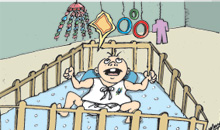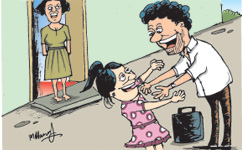The human brain consists of millions of cells called neurons. These brain cells are linked to each other by connections called synapses to form brain circuits. They are formed throughout life, mainly from birth to about 10 years of age. Brain circuits decide the development and behaviour of each individual.
There are five main senses in the human body -- vision, hearing, taste, smell and touch. Language skills, hearing, vision, intelligence and common sense are developed more when they are frequently stimulated. Stimulation means to encourage the senses to be more active or alert. Stimulation should be done to all five senses.
So the more you stimulate your baby, the more brain circuits are formed. For example if a child is read to or spoken to very often, he will develop language skills earlier than a child who is not spoken to very much.
Why you should
stimulate your baby?
It is believed that early stimulation gives the child a good foundation and improves quality of life. It also prevents adolescent problems like addiction to drugs or alcohol developing later on.
Nurturing relationships with caregivers and good nutrition along with quality stimulation optimizes brain development. A child who is shown love, who is hugged, with whom parents spend quality time, whom parents and caregivers spend time playing with, will grow up to be a person who is well adjusted, more secure and emotionally stable as an adult.
On the other hand a child who is constantly abused is more likely to become a backward and insecure adult. Such children will not have good relationships as they are usually psychologically unstable. It is believed that most abusers are those who were abused during their childhood.
Although learning takes place throughout human life, it is most during the first few years of life. Babies learn from exploring their environment.
As parents we should make sure that their environment is safe.
All babies have emotional and psychological needs.
As parents we should be open and respond to them. If you spend quality time with your baby, it is not difficult to understand what he or she needs. Hug your child often and say “I love you”, looking directly in his eyes.
Sing to your baby too. It doesn’t matter if you are a bad singer babies love to listen to your voice. Talk to them often as you can. Although they can’t understand every word, they will sense the meaning with time.
Remember a growing child is like a sponge. So watch what you say in front of a child. Include them in your family chats and get-togethers. They will feel a sense of belonging.
Research has shown that a baby is alert to most sounds while inside the womb. So parents can pat the mother’s tummy and see how the baby responds. The growing baby responds to the mother’s changing emotions. So always keep a pregnant mother happy as the growing baby will feel it too.
Ways of stimulating
your baby
Some may think that a child should have a lot of toys for proper stimulation. But it is not so. Colourful ribbons, pieces of cloth, fruits, vegetables, flowers, leaves etc. found in nature can do wonders and be simple learning tools.
Here are some ways you can stimulate your baby during the first few months.
- Sing lullabies and nursery rhymes
- Play soothing music
- Whisper “ I love you “ often
- Say the baby’s name from various sides of the cot until she moves her eyes or head to the sound
- This will stimulate your baby’s hearing
- Rock and cuddle the baby
- Gently massage the arms and legs
- Gently rubbing various cloths of different textures like satin, wool, cotton etc on their arms will stimulate their sense of touch
- Hang colourful moving objects above the cot. You can even use coloured ribbons or hankies.
- Look into their eyes and smile. Babies who receive a good amount of visual stimulation develop vision faster. With a good vision, babies can explore their surroundings better with increased curiosity. Most of all it enhances the bonding with parents.
When a little older, the baby can be taken to the kitchen. Show the baby vegetables and fruits and let him/her touch them. Describe what you do while cooking. Let her smell a freshly cut orange. This will stimulate the sense of smell. Give them attention and make sure they don’t injure themselves while in the kitchen. Introduce various tastes to stimulate their taste buds. But sugar and salt should be given only after one year of age.
Take your toddler to the garden. Show him trees, birds and flowers. Let him play outside once in a while. Show him how soft the sand is and show how you can make things with clay. Remember though to watch out for mosquitoes while in the garden.
These are some of the simple ways you can use to interact with your baby. Help your precious one to grow up in a stimulating and nurturing environment for a better future.
(The writer is attached to the Health Education Bureau) |





